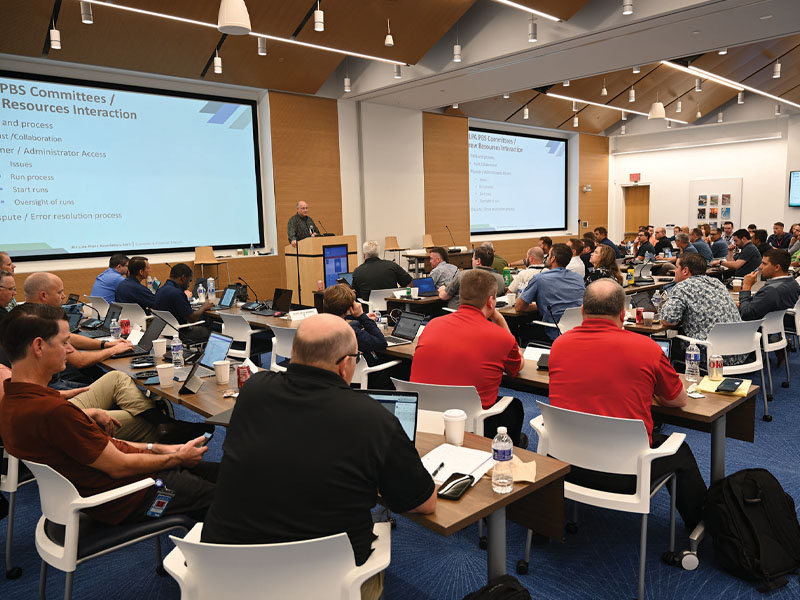Scheduling Reps Compare/Contrast PBS Applications at ALPA Workshop
By John Perkinson, Senior Staff Writer

Jeff Nooger, a senior analyst in ALPA’s Economic & Financial Analysis Department and retired United captain, solicits comments from the group regarding Preferential Bidding System Committee and company crew resources interactions.
Many airlines use preferential bidding systems (PBS) to administer their monthly pilot schedules. However, PBS efficacy varies greatly from carrier to carrier due to differences in available applications and the level of pilot engagement. While some pilot reps may be involved in the entire scheduling process, others only participate in the quality-control phase.
To provide ALPA volunteers a broader understanding of the many ways this important system is being applied and to highlight best practices, ALPA held its first-ever PBS Scheduling Workshop at the Association’s McLean, Va., offices on October 3–5.
More than 60 pilot Scheduling Committee members from 23 airlines gathered for the workshop to discuss the use of PBS applications offered by companies like NavBlue, Advanced Optimization Systems, AD OPT, and Jeppesen. The group examined considerations like PBS accessibility on smartphones and tablets as well as the degree of line-pilot understanding of the most effective schedule-bidding strategies at participating airlines.
PBS allows pilots to bid for monthly schedules by submitting personal preferences such as desired days off, preferred start times, commutability considerations, and other criteria. The system awards these choices based on a combination of pilot seniority; regulatory, company, and contractual constraints; and airline operational demands. This complex bidding system was first introduced in the 1980s, and since then, PBS has gained in popularity with airlines, in part, because it’s more cost effective than traditional line bidding due to greater pilot scheduling efficiency.
ALPA’s three-day workshop featured pilot and staff presentations interspersed with open discussions based on topics that moderator Jeff Nooger, a senior scheduling and work-rule analyst in ALPA’s Economic & Financial Analysis (E&FA) Department, introduced to the group.
Capt. Travis Bealmear (United), a member of his pilot group’s PBS Subcommittee, reviewed the Jeppesen application his carrier has been using for the last 17 years. “User feedback drives change,” he remarked, noting that United pilots are currently working with their airline to update its PBS application based on member suggestions.
Capt. John Shea (JetBlue), his pilot group’s PBS Subcommittee chair, and Capt. Dan Auslander (JetBlue), a Scheduling Committee member, guided workshop attendees through the bidding process at JetBlue using the NavBlue application. “The filter option allows you to find out what trips are available,” said Shea, remarking that, as an example, commuting pilots might want to look for trip layovers where they live.
Displaying the JetBlue calendar, pairings, and bid pages, Auslander observed, “We review everything the company puts out.”
Later in the conference, Capt. Mike Cowan (Delta), his pilot group’s PBS Subcommittee chair, explained the quality-control process the pilots implement using the administrator interface, including running reports, conducting line simulations, and other testing. Delta also uses NavBlue to manage bids, pairings, and other system components in its N-PBS Scheduler, which builds flying schedules for the bid period referred to as blocks.
Corey Tennen, E&FA’s lead scheduling and work-rule analyst, gave a presentation on important considerations for negotiating a PBS letter of agreement. In addition, members of ALPA’s Communications Department briefed the group on learning-management systems as a potential PBS training supplement.
Open discussion during the workshop highlighted best practices, technical issues, applications (such as planning parameters, optimization, and administrator/planner interface functions and practices), contract language support, and implementation suggestions. As part of this dialogue, attendees talked about pilot concerns, including whether the company or union initially responds to pilot disputes; considerations for bidding reserve; how training and other absences are managed;, and whether PBS volunteers receive flight pay loss for their efforts.
“ALPA’s pilot groups are at various stages of the PBS process,” commented Nooger, a retired United pilot who spent 22 years as a System Scheduling Committee chair. “Member feedback from the scheduling conference ALPA held last year indicated an interest in holding a PBS event to specifically examine where different pilot groups stand with this important scheduling tool.”
ALPA’s PBS workshop is the first in a series that the Association is planning to hold to explore different aspects of pilot scheduling with the goal of improving the overall process and, most importantly, member quality of life.

